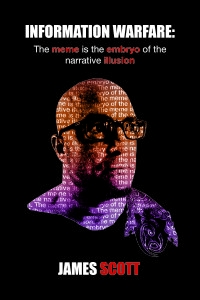Information Warfare: The Meme is the Embryo of the Narrative Illusion
By James Scott
89 pages
Cogito ergo sum (I think, therefore I am), but who does one become when the thought is hijacked? We are no longer a society ruled by geographic lines in the sand laid by men who won and lost wars 50 years ago. Rather, we are a society governed by ideological variation, led by chieftains in a digital tribal society. This is the new world order and the precise opposite of what the self-proclaimed elites had planned. The United Nations is no more relevant than Facebook. The new covert is overt. WikiLeaks is more in the know than an intelligence analyst in the CIA, and Google’s dragnet surveillance censorship algorithm has become the new gatekeeper of critical information that could lead society into a new renaissance. The power shift has gone from a focus on kinetic controls to an all-out battle for the psychological core of the global population. Digitized influence operations have become the new norm for controlling the electoral process, public opinion, and narrative.
The potency of the actors in this space is fierce. Both nation-states and special interest groups in every conceivable variation are battling for the pinnacle position in controlling the public narrative, and though there are many initiatives operating in this space, few understand the actual process for harnessing a consistent grip on the narrative in this digital age. While most actors attempt to use archaic relics, such as the mainstream media, nation-states and sophisticated special interests are gunning for the almighty meme. The meme is the embryo of the narrative, and there is a process to harnessing its potency. Ideas are the composition of memes. Belief systems are the composition of ideas. Belief systems and their reinforcement create the narrative. Control over the meme renders control of the narrative; thus, he who controls the meme controls the population. Therefore, the objective is not to focus on control of the narrative; rather, the hyper-focus has become the creation, mutation, expansion, and replication of the meme.
The mind is the new war space, and the meme is both a subliminal hand grenade and the new nuclear weapon. Psychographic targeting renders the expedience of parasitically embedding the meme within the vast labyrinth of the mind. Psychographic targeting is made easy via big data analytics, the treasure troves of readily available metadata curated by dragnet surveillance capitalists, and a legislative body that lacks the understanding of the dangers of its weaponization. Metadata layered with the weaponization of other digital vectors, such as search engine results, social media, banner placement, blogs, and bots infused with machine learning and artificial intelligence, can introduce, mutate, and expand memes and conversations out of thin air that can instantaneously become part of the mainstream narrative.
Forums, blog comments, hashtags, and YouTube videos have replaced the mainstream media, and the mainstream media has submitted to its position as the automaton regurgitators of the narrative that was introduced by the meme. The meme is the central character in digital influence operations (DIO), and DIO is the ingredient that fuels the new war space as well as the common thread of potency in political warfare, propaganda, and information warfare. The formula is quite simple: Control the meme; control the narrative; and control who is elected to office, how the public perceives current events, and the introduction of a new military offensive. Combined with cyber vectors for distribution, the meme renders an infinite number of variations for an attack. This new frontier harnesses the bleeding-edge technologies and strategies of machine learning, deep learning, socionics, artificial intelligence, cognitive biases, spam bots, memetics, and the psychographic zeroing in on population sub-groups using metadata with the further targeting capabilities that define national and population subgroups’ evolution stage by enlisting concepts such as spiral dynamics, and this is just the tip of the iceberg. This book will cover the DIO space and the use of the meme in this information war.
About James Scott: James Scott is a Senior Fellow and co-founder of ICIT, Senior fellow at CCIOS and the author of more than 40 books with 9 best sellers on the topics of hacking cyborgs, energy sector cybersecurity, nation state cyber espionage and more. He advises to more than 35 congressional offices and committees as well as the American intelligence community, NATO and Five Eyes on cyber warfare and digital influence operations. Mr. Scott's work gains regular coverage in domestic and international publications and his work was referenced by media, academia and industry more than 3000 times in 2017 alone.
About CCIOS: The Center for Cyber Influence Operations Center (CCIOS) is an advisory that studies the weaponized digital applications used by foreign nation-states for influence operations. CCIOS research is hyper-focused on all facets of information warfare, the weaponization of psychographic and demographic information, influence campaigns, and propaganda studies exclusive to digital weaponization.
About ICIT: The Institute for Critical Infrastructure Technology (ICIT), a 501c3 non-profit organization, is America's Cybersecurity Think Tank providing objective advisory to the legislative community, federal agencies and critical infrastructure leaders on critical infrastructure security, cyber warfare, and digital influence operations. Through original cutting-edge research, publications and educational events, ICIT and its members are improving the resiliency of our nation's critical infrastructure sectors and defending National Security.

